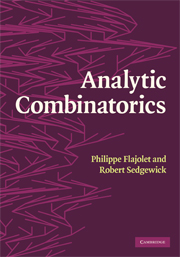PREFACE
Published online by Cambridge University Press: 11 April 2011
Summary
Analytic Combinatorics aims at predicting precisely the properties of large structured combinatorial configurations, through an approach based extensively on analytic methods. Generating functions are the central objects of study of the theory.
Analytic combinatorics starts from an exact enumerative description of combinatorial structures by means of generating functions: these make their first appearance as purely formal algebraic objects. Next, generating functions are interpreted as analytic objects, that is, as mappings of the complex plane into itself. Singularities determine a function's coefficients in asymptotic form and lead to precise estimates for counting sequences. This chain of reasoning applies to a large number of problems of discrete mathematics relative to words, compositions, partitions, trees, permutations, graphs, mappings, planar configurations, and so on. A suitable adaptation of the methods also opens the way to the quantitative analysis of characteristic parameters of large random structures, via a perturbational approach.
Theapproach to quantitative problems of discrete mathematics provided by analytic combinatorics can be viewed as an operational calculus for combinatorics organized around three components.
Symbolic methods develops systematic relations between some of the major constructions of discrete mathematics and operations on generating functions that exactly encode counting sequences.
Complex asymptotics elaborates a collection of methods by which one can extract asymptotic counting information from generating functions, once these are viewed as analytic transformations of the complex domain. Singularities then appear to be a key determinant of asymptotic behaviour. […]
- Type
- Chapter
- Information
- Analytic Combinatorics , pp. ix - xivPublisher: Cambridge University PressPrint publication year: 2009

